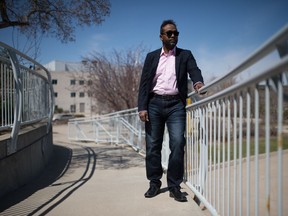'A one-stop shop:' New U of R hub connecting clean energy research and real-world application
"We do believe that collectively we can do this, but separately it's hard to achieve those (emission) targets."

Article content
Hussam Ibrahim knows new and better technologies will be needed in order for Canada to meet its emission goals, but he also sees existing technologies being underused.
Achieving a 40 per cent reduction in the country’s greenhouse gas emissions by 2030 and net-zero emissions by 2050 — as the federal government has committed to — will take more than just great research, believes Ibrahim.
It is going to take a diverse team of experts from all industries working together to bring the right energy solutions to the companies and governments that need them.
“We’re only nine years away from 2030 and the clock is ticking,” Ibrahim said.
In answer to that need, the University of Regina officially launched the Canadian Energy Transition Hub (CETH) on April 15. The Hub was created within the U of R’s pre-existing Clean Energy Technologies Research Institute (CETRI).
But while CETRI focuses on creating new technology, the Hub takes it one step further to create innovative new technology while building the needed partnerships to get that technology out into the world.
“We call it a one-stop shop where we can offer our expertise and experience … and connect our research community with businesses, with investors, with government, with industry,” said Ibrahim, director of CETRI and associate professor of engineering at the U of R.
“We do believe that collectively we can do this, but separately it’s hard to achieve those (emission) targets.”

Ongoing research at the Hub includes carbon capture, utilization and storage, nuclear energy, hydrogen energy and renewable energies like wind and solar. To do this, it brings together experts in not only different types of engineering, but also political scientists, geologists and economists.
Brett Dolter, an assistant professor of economics at the U of R, is thrilled to join the Hub as one of those economists.
As someone who focuses on climate change policy and how it can be created in a cost-effective way, he already has several projects underway, including studying how carbon pricing impacts households and the steps Regina can take to meet its goal of using 100 per cent renewable energy by 2050.
“The Energy Transition Hub is going to be a place to go to learn about the research that’s happening, and a place to go to find opportunities to collaborate with researchers,” Dolter said.
He is eager to work alongside the people designing new technologies by making sure clean energy solutions make sense economically as well as scientifically. Having previously worked for the province’s Ministry of Environment, he is also able to bring his knowledge of what the government looks for when making decisions about clean energy technologies and policies.
While the country’s emissions targets may seem lofty, Ibrahim believes they are achievable through collaboration. If anything, the COVID-19 pandemic has shown just how much collaboration makes possible, he said. He pointed to how quickly several vaccines were developed through researchers and governments working together as an example of what could also be done to meet the country’s emissions targets.
“It’s possible, but there must be the right amount of funding, the policies, the set of skills and expertise and the urgency, just like the COVID-19 situation,” Ibrahim said.
— With files from Evan Radford
The news seems to be flying at us faster all the time. From COVID-19 updates to politics and crime and everything in between, it can be hard to keep up. With that in mind, the Regina Leader-Post has created an Afternoon Headlines newsletter that can be delivered daily to your inbox to help make sure you are up to date with the most vital news of the day. Click here to subscribe.






Postmedia is committed to maintaining a lively but civil forum for discussion. Please keep comments relevant and respectful. Comments may take up to an hour to appear on the site. You will receive an email if there is a reply to your comment, an update to a thread you follow or if a user you follow comments. Visit our Community Guidelines for more information.